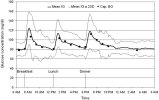Hi,
apologies there are already similar threads but I was hoping for specific advice/suggestions without jumping on someone else's specific question.
I was diagnosed beginning of June. Type 2 diabetes, happened somewhere over the last few years only to be diagnosed. 57 and 61 blood sugars so without much information beyond 'deal with it' by the GP I was started on Metformin. Worked my way up to 1500mg a day with diarrhoea all through out.
Got my metformin changed to the slow release and there were some OK days but now it's just as bad - no sooner do I finish eating do I need to go. I think I had to go number 2 14 times yesterday.
This is miserable. Loperamide just doesn't work. I've had to work from home today on a day I'd otherwise be in the office as I'm now getting worried to leave the house.
I've lost a stone in weight (on purpose) since my diagnosis on 2nd June (1 stone, 1 pound 6 ounces). Not eligible for wegovy or whatever. I'm 24.3.8 stone trying to get back down to 19/20. I'm 38 male, white British, and lactose intolerant.
I've tried to quit as many things as possible - alcohol (didn't drink much anymore anyway), fruit juice, chocolate, potato as much as possible, red meat maybe once a week. Just feels like a long long list of what I can't eat. I'm apparently not supposed to eat carbs, but there's not many options for a quick lunch.
I've just had 2 bagels plain with no condiments and 4 slices of prosciutto and have drank over a litre of water today and immediately after finishing I had to go to the toilet again (twice since eating an hour ago) and another 2 loperamides on top of 4 yesterday.
I feel like I can't eat anything. Can metformin have given me IBS? Things that used to not cause me any issues now are. I have ADHD and feel like I've just been abandoned with a medication that makes me phyiscally unwell and even more shuttered in than I was beforehand.
apologies there are already similar threads but I was hoping for specific advice/suggestions without jumping on someone else's specific question.
I was diagnosed beginning of June. Type 2 diabetes, happened somewhere over the last few years only to be diagnosed. 57 and 61 blood sugars so without much information beyond 'deal with it' by the GP I was started on Metformin. Worked my way up to 1500mg a day with diarrhoea all through out.
Got my metformin changed to the slow release and there were some OK days but now it's just as bad - no sooner do I finish eating do I need to go. I think I had to go number 2 14 times yesterday.
This is miserable. Loperamide just doesn't work. I've had to work from home today on a day I'd otherwise be in the office as I'm now getting worried to leave the house.
I've lost a stone in weight (on purpose) since my diagnosis on 2nd June (1 stone, 1 pound 6 ounces). Not eligible for wegovy or whatever. I'm 24.3.8 stone trying to get back down to 19/20. I'm 38 male, white British, and lactose intolerant.
I've tried to quit as many things as possible - alcohol (didn't drink much anymore anyway), fruit juice, chocolate, potato as much as possible, red meat maybe once a week. Just feels like a long long list of what I can't eat. I'm apparently not supposed to eat carbs, but there's not many options for a quick lunch.
I've just had 2 bagels plain with no condiments and 4 slices of prosciutto and have drank over a litre of water today and immediately after finishing I had to go to the toilet again (twice since eating an hour ago) and another 2 loperamides on top of 4 yesterday.
I feel like I can't eat anything. Can metformin have given me IBS? Things that used to not cause me any issues now are. I have ADHD and feel like I've just been abandoned with a medication that makes me phyiscally unwell and even more shuttered in than I was beforehand.

